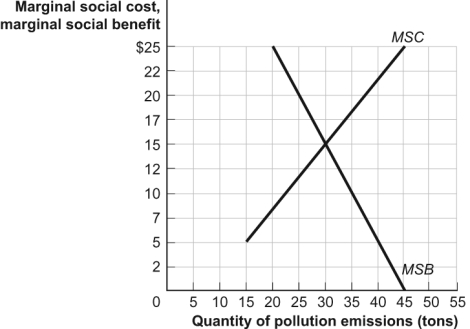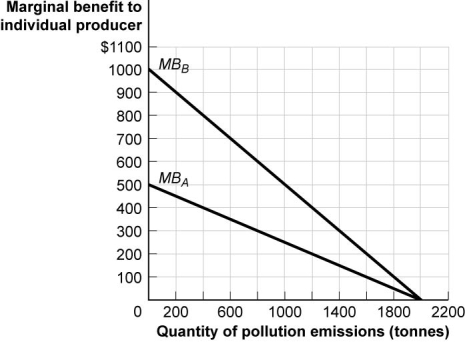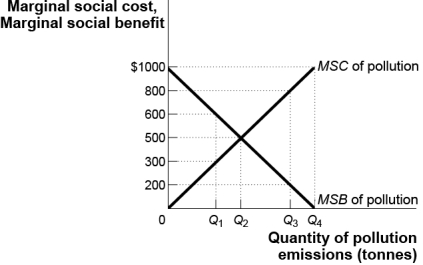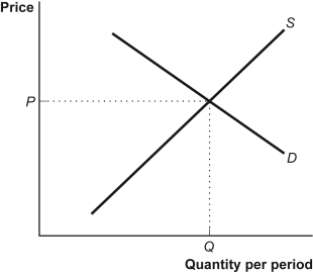A) there will be too little pollution.
B) there will be too much pollution.
C) the marginal social cost of pollution will exceed the marginal social benefit of pollution.
D) pollution will be unabated.
Correct Answer

verified
Correct Answer
verified
Multiple Choice
Use the following to answer questions :
Figure: Efficiency and Pollution  -(Figure: Efficiency and Pollution) Use Figure: Efficiency and Pollution.Assume that firms are the only beneficiaries of pollution and that costs are borne solely by others in the society.If the government imposed an environmental standard that did NOT allow the quantity of pollution to exceed 30 tonnes,there would be:
-(Figure: Efficiency and Pollution) Use Figure: Efficiency and Pollution.Assume that firms are the only beneficiaries of pollution and that costs are borne solely by others in the society.If the government imposed an environmental standard that did NOT allow the quantity of pollution to exceed 30 tonnes,there would be:
A) a socially optimal quantity of pollution.
B) too little pollution because its marginal social benefit would exceed its marginal social cost.
C) too much pollution because its marginal social cost would exceed its marginal social benefit.
D) too much pollution because any pollution is too much from an economist's perspective.
Correct Answer

verified
Correct Answer
verified
Multiple Choice
Use the following to answer questions :
Figure: City with Two Polluters  -Which statement describes a positive externality?
-Which statement describes a positive externality?
A) Sam dug a pond,so he could go fishing,but the pond has contributed to an explosion of mosquitoes in your neighbourhood.
B) Sam has dozens of cats,and they come into your yard to hunt the birds that come to your birdbath.
C) Sam buys a dilapidated house,renovates it,and increases the property values of all the houses in the neighbourhood.
D) Liquid waste from Sam's chicken farm flows into a neighbour's well water.
Correct Answer

verified
Correct Answer
verified
Multiple Choice
Suppose that government officials have set an emissions tax to reduce pollution.Assume that the optimal tax would be $1 500,but government officials have set the tax at $500.At the equilibrium with the $500 tax:
A) there will be too much pollution.
B) the marginal social cost of pollution will be less than $500.
C) the marginal social benefit of pollution will be less than $500.
D) the marginal social benefit of pollution will be more than $500.
Correct Answer

verified
Correct Answer
verified
True/False
Emissions taxes and tradable emissions permits both ensure that any given reduction in total pollution is achieved at the lowest possible cost.This is not the case for environmental standards since they fail to ensure that those who can reduce pollution most cheaply are in fact the ones to do so.
Correct Answer

verified
Correct Answer
verified
Multiple Choice
Activities that generate external costs will likely be carried out at levels that _____ those that would be efficient.
A) are equal to
B) are less than
C) exceed
D) compete with
Correct Answer

verified
Correct Answer
verified
True/False
Externalities exist when individuals impose costs or confer benefits on others but don't have an incentive to take those costs or benefits into account.
Correct Answer

verified
Correct Answer
verified
Multiple Choice
Use the following to answer questions : -(Table: Externalities from Parks) Use: Table: Externalities from Parks.The table shows the marginal social benefit and the marginal social cost of preserving various amounts of land in a city for a public park.Suppose that parks result in positive benefits to the community as a whole but that the marginal private benefit that any one individual in the community gets from parks is close to 0.Without government intervention,at the amount of land dedicated to the public park,the marginal social cost will be:
A) $225.
B) $150.
C) $100.
D) $0.
Correct Answer

verified
Correct Answer
verified
Multiple Choice
Use the following to answer questions :
Figure: City with Two Polluters  -Which example is a good or market activity that is associated with a positive externality?
-Which example is a good or market activity that is associated with a positive externality?
A) smoking cigarettes
B) listening to a new CD with earbuds
C) innovation in the semiconductor industry
D) an indoor classical music concert with tickets that each cost $50
Correct Answer

verified
Correct Answer
verified
Multiple Choice
Use the following to answer questions : -(Table: Externalities from Parks) Use: Table: Externalities from Parks.The table shows the marginal social benefit and the marginal social cost of preserving various amounts of land in a city for a public park.Suppose that parks result in positive benefits to the community as a whole but that the marginal private benefit that any one individual in the community gets from parks is close to 0.At the socially optimum amount of land dedicated to the public park,the marginal social benefit will be:
A) $225.
B) $150.
C) $100.
D) $0.
Correct Answer

verified
Correct Answer
verified
Multiple Choice
If the marginal social benefit received from pollution is equal to its marginal social cost:
A) society's well-being can be improved if the quantity of pollution increases.
B) society's well-being can be improved if the quantity of pollution decreases.
C) society has achieved its socially optimal level of pollution.
D) the market is producing too much pollution.
Correct Answer

verified
Correct Answer
verified
True/False
According to the Coase theorem,only when transaction costs are extremely high can two parties internalize a negative externality.
Correct Answer

verified
Correct Answer
verified
Multiple Choice
Use the following to answer questions :
Figure: MSB and MSC of Pollution  -(Figure: MSB and MSC of Pollution) Use Figure: MSB and MSC of Pollution.Assume that firms are the only beneficiaries of pollution and that costs are borne solely by others in the society.Suppose that pollution is unregulated.What level of emissions tax would move the level of pollution to the socially optimal level?
-(Figure: MSB and MSC of Pollution) Use Figure: MSB and MSC of Pollution.Assume that firms are the only beneficiaries of pollution and that costs are borne solely by others in the society.Suppose that pollution is unregulated.What level of emissions tax would move the level of pollution to the socially optimal level?
A) $100 per tonne
B) $800 per tonne
C) $500 per tonne
D) $300 per tonne
Correct Answer

verified
Correct Answer
verified
Multiple Choice
Suppose that government officials have set an emissions tax to reduce pollution.Assume that the optimal tax would be $500,but government officials have set the tax at $900.At the equilibrium with the $900 tax:
A) there will be too much pollution.
B) the marginal social cost of pollution will be less than $900.
C) the marginal social benefit of pollution will be $900.
D) the marginal social benefit of pollution will be more than $900.
Correct Answer

verified
Correct Answer
verified
Multiple Choice
Which factor is an environmental standard?
A) tradable emission permits
B) taxes on the level of pollution
C) legal limits on sulphur dioxide emissions
D) production subsidies
Correct Answer

verified
Correct Answer
verified
Multiple Choice
Use the following to answer questions :
Figure: Model of a Competitive Market  -(Figure: Model of a Competitive Market) Use Figure: Model of a Competitive Market.Given the figure,if there are external costs:
-(Figure: Model of a Competitive Market) Use Figure: Model of a Competitive Market.Given the figure,if there are external costs:
A) resources will be underallocated to the production of the good.
B) resources will be overallocated to the production of the good.
C) resources will be efficiently allocated to the production of the good.
D) the price at P will be higher than if there were no external costs.
Correct Answer

verified
Correct Answer
verified
Multiple Choice
When the government attempts to reduce the noise from airplanes by restricting the noise level from a jet engine to less than 50 decibels,it is using a(n) :
A) environmental standard.
B) emissions tax.
C) Pigouvian tax.
D) tradable emissions permit.
Correct Answer

verified
Correct Answer
verified
Multiple Choice
If a good that involves external costs is priced to take these costs into account,then its price will likely:
A) fall,and output will likely rise.
B) rise,and output will likely fall.
C) not change,but output will likely fall.
D) rise,but output will likely stay the same.
Correct Answer

verified
Correct Answer
verified
Multiple Choice
Use the following to answer questions :
Figure: Pollution and Efficiency  -(Figure: Pollution and Efficiency) Use Figure: Pollution and Efficiency.Point _____ in the figure represents an efficient solution in this market,where sulphur emissions are a result of production.
-(Figure: Pollution and Efficiency) Use Figure: Pollution and Efficiency.Point _____ in the figure represents an efficient solution in this market,where sulphur emissions are a result of production.
A) A
B) B
C) E
D) F
Correct Answer

verified
Correct Answer
verified
True/False
The optimal Pigouvian tax is equal to the marginal social cost of pollution at the socially optimal quantity of pollution (assuming that there are no private costs from pollution to the polluter).
Correct Answer

verified
Correct Answer
verified
Showing 161 - 180 of 194
Related Exams